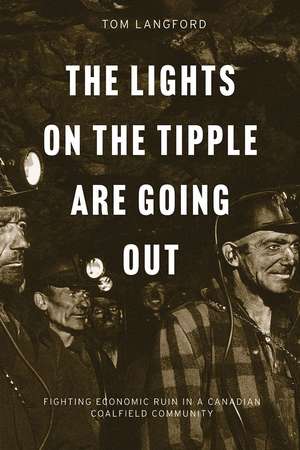The Lights on the Tipple Are Going Out: Fighting Economic Ruin in a Canadian Coalfield Community
Autor Thomas Langforden Limba Engleză Hardback – 8 oct 2024
The Canadian postwar economic boom did not include one western coal-mining region. When the Canadian Pacific Railway switched to diesel power, over 2,000 coal production jobs were lost in the Crowsnest Pass and Elk Valley. The Lights on the Tipple Are Going Out tells the story of its fight for survival.
Underground mine closures began in 1950, prompting attempts by unions, leftist parties, municipal governments, and business groups to save the local economy. Efforts to reindustrialize in the mid-1960s brought unregulated growth, unsafe working conditions, and pollution. Starting in 1968, new strip mines were built to produce metallurgical coal for Asia-Pacific steelmakers.
Not only is this an interesting regional history, but the consideration of the role of labor unions, local communists, and grassroots environmentalists makes it especially compelling. Today, with technological change in steel manufacturing on the horizon and propelled by the climate crisis, Langford argues that the Crowsnest Pass and Elk Valley must look toward ecosystem restoration, sustainable economic activities, and the inclusion of First Nations in decision making to embrace a future beyond coal.
Preț: 680.56 lei
Preț vechi: 883.84 lei
-23% Nou
Puncte Express: 1021
Preț estimativ în valută:
130.23€ • 135.09$ • 108.59£
130.23€ • 135.09$ • 108.59£
Carte disponibilă
Livrare economică 06-20 martie
Preluare comenzi: 021 569.72.76
Specificații
ISBN-13: 9780774869287
ISBN-10: 0774869283
Pagini: 358
Ilustrații: 23 halftones, 2 maps, 14 tables
Dimensiuni: 152 x 229 x 30 mm
Greutate: 0.71 kg
Editura: University of British Columbia Press
Colecția University of British Columbia Press
ISBN-10: 0774869283
Pagini: 358
Ilustrații: 23 halftones, 2 maps, 14 tables
Dimensiuni: 152 x 229 x 30 mm
Greutate: 0.71 kg
Editura: University of British Columbia Press
Colecția University of British Columbia Press
Notă biografică
Tom Langford is professor emeritus of sociology at the University of Calgary. He is the author of Alberta’s Day Care Controversy: From 1908 to 2009 and Beyond and co-editor, with Wayne Norton, of A World Apart: The Crowsnest Communities of Alberta and British Columbia. He has contributed various articles to Prairie Forum, BC Studies, Alberta History, and Labour/Le Travail.
Cuprins
Introduction: Interpretive and Comparative Perspectives on Deindustrialization in the Crowsnest Pass and Elk Valley, 1945–1968
1 Working Class on the Rise, 1945–49: Collective Struggles, Labour Improvements, and Larger Goals
2 A Crisis Begins: Three Days a Week and Mine Closures, 1950–56
3 Ghost Town Future? Searching for Economic Revitalization, 1957–62
4 We Were Continually Losing Membership and Losing Public Support: Tracing the Ruin of the Communist Party, 1945–62
5 Pursuing Alternatives for Growing the Economy, 1963–68: Dead Ends, A Tragic Underground Explosion, and A New Beginning for Coal
6 Growth At What Cost? Community and Political Struggles, 1963–68
Conclusion: Lessons and Opportunities for a Future Beyond Coal
Notes; Bibliography; Index
1 Working Class on the Rise, 1945–49: Collective Struggles, Labour Improvements, and Larger Goals
2 A Crisis Begins: Three Days a Week and Mine Closures, 1950–56
3 Ghost Town Future? Searching for Economic Revitalization, 1957–62
4 We Were Continually Losing Membership and Losing Public Support: Tracing the Ruin of the Communist Party, 1945–62
5 Pursuing Alternatives for Growing the Economy, 1963–68: Dead Ends, A Tragic Underground Explosion, and A New Beginning for Coal
6 Growth At What Cost? Community and Political Struggles, 1963–68
Conclusion: Lessons and Opportunities for a Future Beyond Coal
Notes; Bibliography; Index
Recenzii
"The Lights on the Tipple Are Going Out is richly, extraordinarily detailed. It is simply excellent."
"A rare Canadian coalfield story. Tom Langford has covered it all, from deindustrialization to environmental justice."
